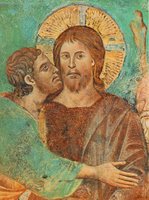
After being lost for nearly 1,700 years, the Gospel of Judas was recently restored, authenticated, and translated.
(full info here)Biblical accounts suggest that Jesus foresaw and allowed Judas's betrayal.
As told in the New Testament Gospels, Judas betrayed Jesus for "30 pieces of silver," identifying him with a kiss in front of Roman soldiers. Later the guilt-ridden Judas returns the bribe and commits suicide, according to the Bible.
The Gospel of Judas, however, gives a very different account. The text begins by announcing that it is the "secret account of the revelation that Jesus spoke in conversation with Judas Iscariot during a week, three days before he celebrated Passover."
It goes on to describe Judas as Jesus' closest friend, someone who understands Christ's true message and is singled out for special status among Jesus' disciples.
In the key passage Jesus tells Judas, "'you will exceed all of them. For you will sacrifice the man that clothes me.'"
Kasser, the translation-project leader, offers an interpretation: "Jesus says it is necessary for someone to free him finally from his human body, and he prefers that this liberation be done by a friend rather than by an enemy.
"So he asks Judas, who is his friend, to sell him out, to betray him. It's treason to the general public, but between Jesus and Judas it's not treachery."

The surviving copy of the gospel was written in the third or fourth century A.D., but the text was known prior to A.D. 180. In that year St. Irenaeus—then the bishop of what is now Lyon, France—published Against Heresies, a volume intended to help unify the Christian church.
St. Irenaeus's method was to savage alternative theological views and interpretations—including the Gospel of Judas—which he referred to as "fictitious histories."
The newfound account challenges one of the most firmly rooted beliefs in Christian tradition.
Now the most famous antichrist appears to be an enlightened soul, who realized that the betrayal was part of God's master plan to save humanity by having his son crucified. So Judas, being the big man that he was, decided he could live with his soiled place in posterity if it meant everyone got to go to heaven. Other heretical movements advanced ideas such as the notion that Judas was actually crucified in the place of Jesus.

 This weekend the Netherlands celebrated the birthday of our previous queen. It's a national holiday and many people visit Amsterdam because of the events that are organized. On Queens Day you are allowed to sell personal stuff so the centre of Amsterdam turns into a gigantic market place. Last week my son asked me to buy him a new computer game. I told him that he could earn it himself by selling some of his old toys on the market. This weekend he earned his new game himself (6 y.o.) with a little help of his girlfriend (and us of course). First lessons in economics..
This weekend the Netherlands celebrated the birthday of our previous queen. It's a national holiday and many people visit Amsterdam because of the events that are organized. On Queens Day you are allowed to sell personal stuff so the centre of Amsterdam turns into a gigantic market place. Last week my son asked me to buy him a new computer game. I told him that he could earn it himself by selling some of his old toys on the market. This weekend he earned his new game himself (6 y.o.) with a little help of his girlfriend (and us of course). First lessons in economics..
































